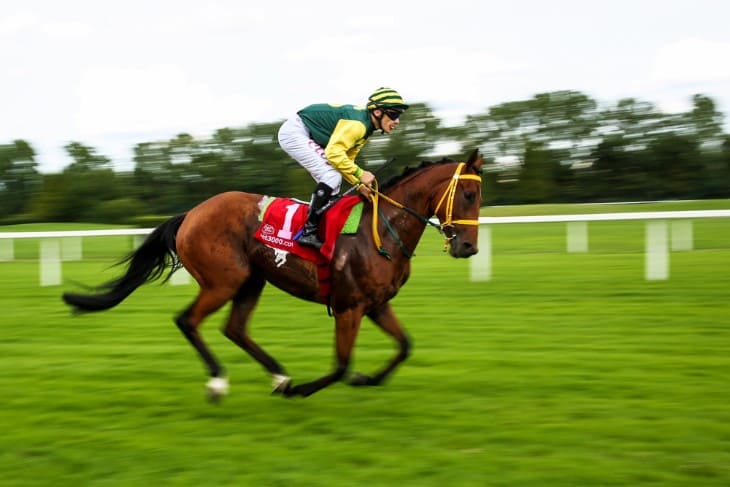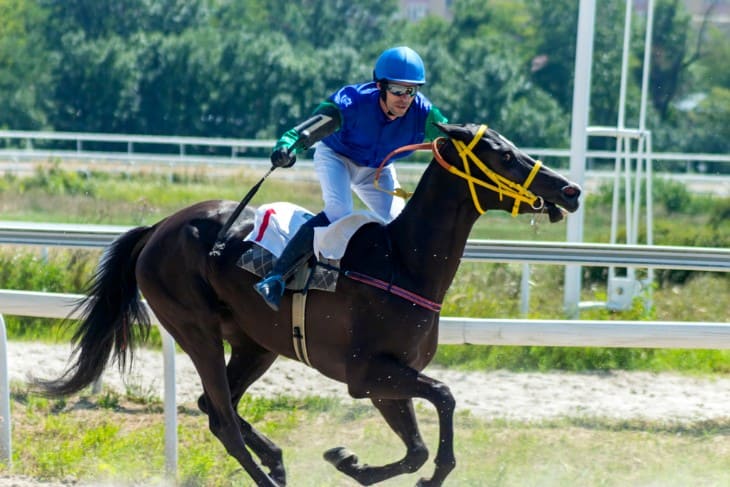In the UK, apprentice races present a unique twist to the conventional horse racing scene. They provide a chance to see the sport's future stars and offer attractive betting opportunities. These are races where apprentice jockeys, still in their early stages of learning under the tutelage of seasoned professionals, take charge. Their inexperience is usually considered by giving them an allowance regarding weight, which can significantly influence the race outcome. Understanding how to bet on apprentice races is a way to enjoy horse racing and earn money. Here's a comprehensive guide to get you started.
1. Apprentice Race
An apprentice race in Britain is a horse race for young jockeys just starting their careers. These jockeys are known as apprentices and are learning to be professional riders at this stage. They ride with experienced trainers who help them improve their riding skills.
Pound-for-pound, apprentice jockeys carry less weight than other senior jockeys participating in these games. This is done purposely so that younger riders can have an equal opportunity against their experienced counterparts. Generally, it ranges from 3 to 7 lbs.
Apprentice races were introduced mainly for novice jockeys to gain experience through real-race situations and test their skills while competing fiercely with others like themselves. Fans also look forward to these events because they hope that some future top horses will emerge during those contests.
However, such competitions go beyond entailing riders' participation and pose a remarkable challenge for betting activities. Because less-experienced pilots are involved, sometimes races may become unpredictable, leading even to higher prices for bets placed on them, making these races so attractive for value punters.
Apprentice races contribute to many aspects of UK horse racing, including preparing jockeys for higher levels. Moreover, they help maintain a vibrant and competitive sport by constantly attracting fresh talent.
2. Researching Apprentice Jockeys
Researching apprentice jockeys is vital when betting on apprentice races in the UK. There is a lot of variability within this group concerning training and experience, as these riders are still learning the ropes. Review recent results to find out who could perform well in future events.
Consider how frequently a jockey has been successful or placed highly recently. This will give you an indication of their current form and consistency. Similarly, it may be helpful to see their successes on different courses using various horses, as some riders seem more at home on certain tracks than others.
Check if any patterns can be identified from their racing records. A young rider beginning to finish strongly or achieving more top fives might be improving strategy and handling pressure better. They could make good selections for future events.
Alternatively, pay attention to assessments from their coaches and racing pundits. Sometimes, insights from individuals who work closely with these jockeys can offer crucial insights into their potential and future performances.
Remember that apprentice jockeys are unpredictable because they are still learning the race. Therefore, there is likely to be more risk when betting on them, but there is also the possibility of high rewards if you pick a winner. By researching extensively, however, one will boost his/her chances of placing an intelligent bet.
Researching apprentice jockeys gives you an upper hand in your betting strategies. This enables you to identify those who need a wager and those who may be improving in apprentice races.

3. The Role of the Trainer
- The Impact of Trainers on Apprentice Jockeys: The trainer's role is very significant in apprentice races. Trainers must teach the apprentice jockeys and get them prepared for races. In addition, by offering expert advice and strategies, a good trainer can significantly affect an apprentice's performance in many ways. Notably, some trainers have reputations built on producing successful riders from apprenticeships; they have this knack for getting the best out of young riders, teaching them how to ride well strategically and improve their riding style, too.
- Selection of Horses for Races: Trainers must also make a critical decision regarding which horses suit a particular apprentice jockey to ride. This choice could determine whether or not such horses would win races. A trainer matches a horse with a rider by considering the horse's nature, the rider's way of riding, and strength. Pairing horses with jockeys effectively increases confidence levels among these riders, thus making it easy for them to win any contest.
- Monitoring Progresses And Making Adjustments: Effective trainers closely monitor their trainees' progress and adjust their training routines accordingly. They are in a position to highlight areas where jockeys need more training or improvement, such as good starts and correct pacing of the races. Trainers enhance apprentices' competence to perform well in races by developing these skills.
The overall effect of trainers on apprentice races should be noticed. In addition to technical preparation, trainers are also responsible for the mental aspect. An experienced trainer who can mentor young jockeys is one of the critical elements behind successful apprentices in the highly competitive horse racing industry.
4. Examining the Horse's Form
When betting on Apprentice races, it is crucial to consider both the ability of an individual jockey and the form of the horse itself. A horse's form gives insight into how it might fare in a race, mainly because of novice riders.
Firstly, scrutinise this horse's recent results from past meetings. This will help you determine if it has been finishing strongly or struggling lately. In addition, check on which distances it has performed best over. Some horses run better over long distances, while others are known as excellent sprinters.
The horse has done well with different jockeys, including apprentices. This could indicate that some horses thrive with lighter weights, which apprentice jockeys carry around, and therefore, better performances are observed. Conversely, when a horse has failed to deliver with several different riders, it is not worth the risk of placing bets regardless of how much potential the current jockey may have.
Also, it's good to note how a horse has performed on different racing surfaces and under changing weather conditions. Some horses perform relatively well on dry tracks, but others will shine more when wet. Knowing these biases lets you determine if a particular horse has an edge in any given race.
By carefully studying a horse's past races, you gain insights beyond what the jockey can do. This overall perspective of horse and rider sets you up for making smarter bets in apprentice races, and such strategic moves can lead to good results.
5. The Implication of Weight Allowance
Knowing the importance of weight allowance in apprentice races would be helpful for those who plan to place a bet on these events. An apprentice jockey has a weight allowance, meaning they carry less weight than more experienced jockeys. This could range from 3 to 7 pounds and is designed to make it a fair competition, providing an even chance for the less experienced jockeys.
The result of a race can significantly depend on the weight allowance given. Horses with lesser weights can run faster and keep their pace for relatively longer distances than heavier horses. This gives horses ridden by apprentices an advantage over those ridden by experienced jockeys such as they may have to compete with.
However, each race will determine how advantageous or disadvantageous this weight allowance is. The horse's form, distance travelled during the race, and track conditions, among other factors, could determine how much benefit is derived from the weight allowance. At short distances, for example, the difference made by several pounds might be insignificant compared to long distances where stamina becomes necessary.
When considering betting on apprentice races, you need to balance things like the horse's form and the jockey's skill level against possible benefits that come with a weight advantage, such as that enjoyed by apprenticeship riders. A holistic consideration of these aspects will improve your decision-making, leading you to spot valuable opportunities in wagering where being weighed on favours an apprentice-ridden horse.
There is no doubt regarding the significance of weight allowances in apprentice races. Simply comprehending their effect and how they interact with other elements in racing can influence the outcome of races. This will improve your betting strategy and consequently improve your chances at racetracks.

6. How market movements affect betting odds
- Observing odds: In horse racing, especially when dealing with apprentice races, market movements and betting odds are critical factors. Odds are the amount of money you could win if your selection is successful. They also give insight into how the general public and bookmakers perceive the chances of each horse winning a race. If there has been an influx of a particular horse, then people believe that this horse has a great chance of winning.
- The significance of odds movements: Following significant changes in odds is essential. This could mean there is information concerning the horse's condition or confidence in the apprentice's abilities riding the horse. Monitoring these changes can help you make more informed betting decisions.
- Using odds as guidance: Even though betting odds are essential, they should not be considered alone when developing your betting strategy. In some instances, odds can change according to factors besides the chances of horses winning, such as opinion or influence from prominent gamblers who have placed huge sums against specific horses. Consequently, use odds within other information such as horse form, the jockey's capacity, and racing conditions.
7. Strategies for Betting on Apprentice Races
Understanding market trends and interpreting the betting odds in apprentice races is one of the best ways to develop a winning betting strategy. Knowing which horses offer value at different times and when to bet can help you maximise returns. Eye odds, but balance it with deep research to make the wisest bets.
- Start with Small Bets: Small bets are advisable when beginning to wager on apprentice races. Such contests may be very unpredictable due to the riders' inexperience. By starting small, one can see how these races operate without losing much money if things go wrong. With time, as you understand them better and feel more confident about your picks, you can gradually increase your stake depending on what makes you comfortable.
- Spread Your Bets: Consider spreading your wagers among different apprentices or races. This will help lower risk, as all your money won't be put on one outcome alone. This approach increases the chances of winning some wagers even if one loses others. Furthermore, it allows one to explore many other forms of punting while at the same time gaining insights into apprentice race dynamics.
- Focus on Form and Trainer Insights: Horses are in good form with skilled trainers who have successfully developed many novices who would make strong bets. These elements are often better than just looking at an apprentice's experience alone.
- Watch the Market Movements: It would help if you observed how bookmakers alter their prices before a race begins; market movements indicate support by astute punters and insiders towards particular horses or jockeys. However, remember that this information should be considered independently in collaboration with comprehensive research.
These simple strategies allow you to navigate the complexities of betting on apprentice races more effectively. Starting small, spreading your bets, and basing your decisions on thorough research and market insights can enhance your betting experience and improve your chances of success. Remember, the key to successful betting is picking winners and managing your bets wisely.
Bottom Line
Betting on apprentice races in the UK is exciting yet challenging. It provides a future for young jockeys while allowing you to enjoy horse racing today. Understanding such speed tests, thorough research, and smart punting will make horse racing even more enjoyable and profitable. As always, remember to gamble responsibly and appreciate the exquisiteness of these budding talents on the track.








